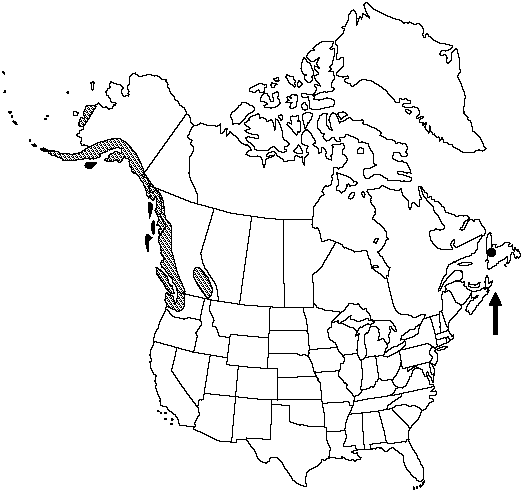Difference between revisions of "Huperzia miyoshiana"
Acta Bot. Yunnan. 3(3): 303, 304. 1981.
FNA>Volume Importer |
imported>Volume Importer |
||
| (6 intermediate revisions by 2 users not shown) | |||
| Line 8: | Line 8: | ||
}} | }} | ||
|common_names=Pacific fir-moss;lycopode de Miyoshi | |common_names=Pacific fir-moss;lycopode de Miyoshi | ||
| − | |basionyms={{Treatment/ID/ | + | |basionyms={{Treatment/ID/Basionym |
|name=Lycopodium miyoshianum | |name=Lycopodium miyoshianum | ||
|authority=Makino | |authority=Makino | ||
| + | |rank=species | ||
| + | |publication_title=Bot. Mag. (Tokyo) | ||
| + | |publication_place=12: 36. 1898 | ||
}} | }} | ||
|synonyms={{Treatment/ID/Synonym | |synonyms={{Treatment/ID/Synonym | ||
|name=Lycopodium selago subsp. miyoshianum | |name=Lycopodium selago subsp. miyoshianum | ||
|authority=(Makino) Calder & Roy L. Taylor | |authority=(Makino) Calder & Roy L. Taylor | ||
| − | }}{{Treatment/ID/Synonym | + | |rank=subspecies |
| + | }} {{Treatment/ID/Synonym | ||
|name=Lycopodium selago var. miyoshianum | |name=Lycopodium selago var. miyoshianum | ||
|authority=(Makino) Makino | |authority=(Makino) Makino | ||
| − | }}{{Treatment/ID/Synonym | + | |rank=variety |
| + | }} {{Treatment/ID/Synonym | ||
|name=Lycopodium tenuifolium | |name=Lycopodium tenuifolium | ||
|authority=Herter | |authority=Herter | ||
| − | }}{{Treatment/ID/Synonym | + | |rank=species |
| + | }} {{Treatment/ID/Synonym | ||
|name=Urostachys miyoshiana | |name=Urostachys miyoshiana | ||
|authority=(Makino) Nessel | |authority=(Makino) Nessel | ||
| + | |rank=species | ||
}} | }} | ||
|hierarchy=Lycopodiaceae;Huperzia;Huperzia miyoshiana | |hierarchy=Lycopodiaceae;Huperzia;Huperzia miyoshiana | ||
| Line 46: | Line 53: | ||
-->{{#Taxon: | -->{{#Taxon: | ||
name=Huperzia miyoshiana | name=Huperzia miyoshiana | ||
| − | |||
|authority=(Makino) Ching | |authority=(Makino) Ching | ||
|rank=species | |rank=species | ||
| Line 60: | Line 66: | ||
|publication year=1981 | |publication year=1981 | ||
|special status= | |special status= | ||
| − | |source xml=https:// | + | |source xml=https://bitbucket.org/aafc-mbb/fna-data-curation/src/2e0870ddd59836b60bcf96646a41e87ea5a5943a/coarse_grained_fna_xml/V2/V2_457.xml |
|genus=Huperzia | |genus=Huperzia | ||
|species=Huperzia miyoshiana | |species=Huperzia miyoshiana | ||
Latest revision as of 20:23, 5 November 2020
Shoots erect, determinate, 12–18(–25) cm, clustered to long-decumbent, to 8 cm; leaves in mature portion smaller than leaves in juvenile portion; annual constrictions absent; juvenile growth sharply down-curled forming ± 1/2 circle, leaves at tip appressed to form pointed apex. Leaves in juvenile (proximal) portion spreading-reflexed (shade) to appressed-ascending (sun), in mature (distal) portion spreading-ascending (shade) to appressed-ascending (sun), light green to yellow, lustrous; leaves in juvenile portion narrowly lanceolate, parallel-sided, 4.5–7 mm; leaves in mature portion triangular, widest at base, 3.5–5.5 mm; margins entire; stomates present on both surfaces, numerous, 35–80 per 1/2 leaf on adaxial surface. Gemmiferous branchlets produced in 2–3 pseudowhorls at end of annual growth; gemmae 3.5–5 × 3–4 mm, lateral leaves 1.25–1.75 mm wide, acute with acuminate tip. Spores 25–34 µm.
Habitat: On rock or terrestrial on moss-covered boulders in talus slopes, cliffs, near waterfalls, marshes in conifer forest
Elevation: 0–1600(–1800) m
Distribution

B.C., Nfld., Alaska, Wash., Asia in Japan, Korea, Siberia.
Discussion
Selected References
None.